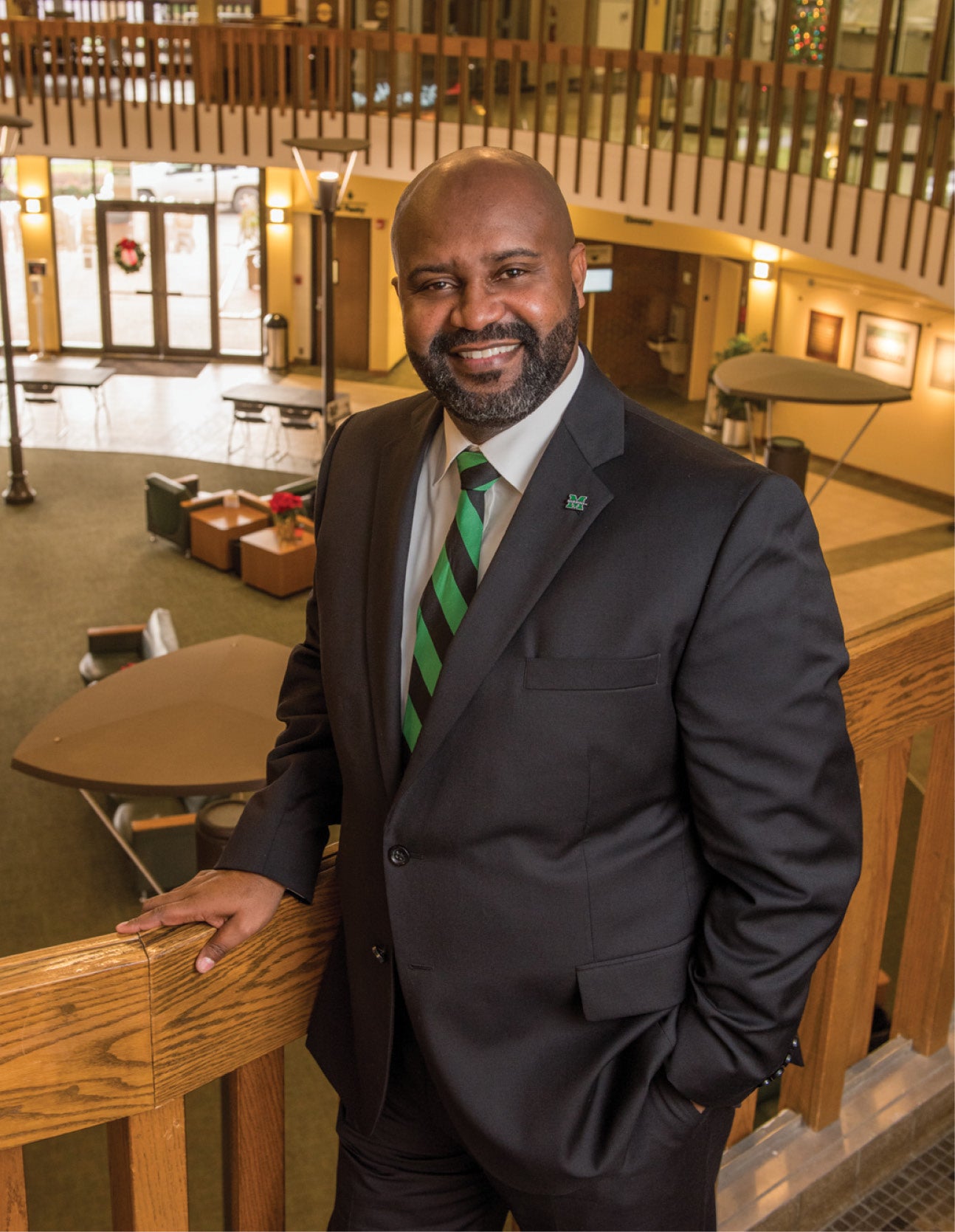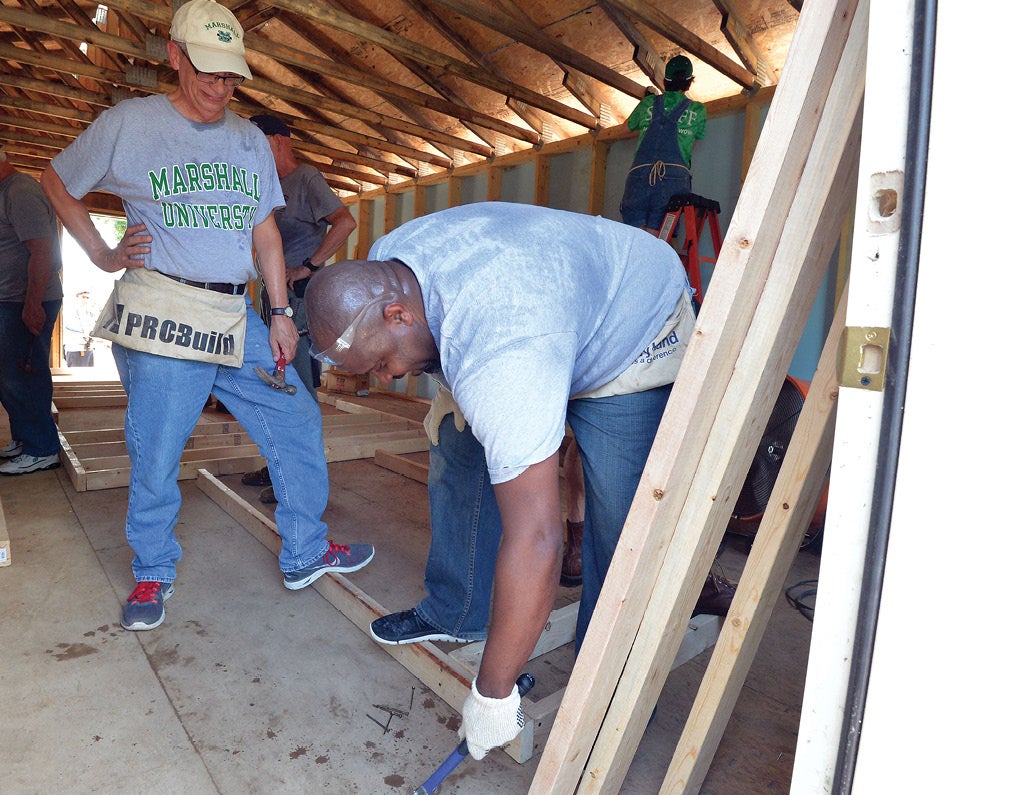 Cedric Gathings makes sure students’ voices are heard.
Cedric Gathings makes sure students’ voices are heard.
It was the aftermath of a contentious presidential election. Emotions were high. No doubt, lively conversations were going on throughout the Tri-State, the nation, even the world. There’s no telling how many callous remarks were made in those hours, from all sides of the political realm.
One of them — a tweet written by a Marshall University student and dispersed to countless others via social media — got quite a bit of attention locally.
It was about Donald Trump and it seemed to endorse inappropriate groping. Whatever the student’s true intention — whether simply to amuse or not — it was a remark that presented challenges and a great deal of discussion on Marshall’s campus. If said at a small gathering, the comment may have only caused eyes to roll or launched a private conversation about respect. Instead, it led to a storm on social media, phone calls, hastily organized meetings and a carefully prepared press statement issued by the university.
In turn, it highlighted the challenges that universities face these days, trying to both monitor and maintain an atmosphere of respect among its students and community, when social media makes it so easy to disseminate divisive words.
“It’s clear that many people are expressing strong feelings on social media this morning without fully thinking it through or considering the ramifications of the language they are using,” Marshall University President Jerome A. Gilbert said in the press statement that was released Wednesday, Nov. 9, 2016. “I condemn, in no uncertain terms, the language in the tweet attributed to one of our students. By suggesting an action that is inconsistent with our university’s core values — in direct opposition to the Marshall University Creed and everything the Marshall family stands for — it does not represent behavior we expect from our students. Language like this can only be viewed as threatening and offensive not only to women but to all members of our community.”
From that point, it was a matter of moving forward, said Cedric Gathings, vice president for student affairs at Marshall. Gathings’ position at Marshall is actually a new one, intended to expand the university’s emphasis on building relationships with students.
He was previously assistant vice president for multicultural affairs at Mississippi State University and joined Marshall in July to oversee the Office of Student Affairs, which covers a lot of programs, including a counseling center, student government, military and veterans affairs, disability and health services and student conduct.
Gathings has said he sees his position as a chance to build unity. That largely involves listening and making sure the voices of students — and others who are working hard on their behalf — are heard. And that’s exactly what he and the division did in November after the election.
The Office of Student Affairs met and discussed ways to protect the integrity of all students, including offering more opportunities for students to get trained in social media etiquette and best practices moving forward. The office also made counselors available, offering a safe space for students who wanted to vent or talk about their concerns following the election.
“I didn’t see this as a challenge, but as an opportunity to talk with students about being respectful,” Gathings said. “We have a great group of students here who see social media as a good way to communicate, and overall, they’re very respectful.”
The office organized a meeting for Marshall community members to share what was on their minds after the election, said Carla Lapelle, associate dean of student affairs.
“I did organize a program for students to talk about the election, but that was a result of a few students coming forward with questions about immigration status and race relations, given some of the comments throughout the campaign,” Lapelle said. The meeting drew fewer students than they’d hoped, but more faculty and staff than they were expecting, she said, adding that it sparked an excellent conversation.
“We were able to address immigration concerns as best we could, since we aren’t sure of what the future holds,” she said. “We were able to educate about the whole election process and reasons people vote as they do, and aspects of how the government works. Besides their questions, our participants had some very insightful comments. It was a great 90 minutes.”
In regards to students’ reactions to the questionable tweet, Student Body President Matt Jarvis said Marshall University has a diverse group of students who had diverse opinions about it. Some thought it was an example of freedom of speech, and others were understandably offended. He believes they’re all fortunate to have faculty, staff and administrators who recognize learning opportunities when they see them.
The use of social media is at its best when there is careful thought and consideration by all its users.
“We all have to learn that some people have different views than we do,” Jarvis said. “People are going to say things that we don’t agree with or trust or want to put faith in. That’s the world we’re in.… As for the majority of students, I was proud of how they handled themselves. They were respectful and mindful… and remembered that even if we disagree, we should respect each other’s opinions.”
 Social media is not going away, Gathings said. It’s often used to share helpful information as well. And it is such a big responsibility to make sure that it is monitored and used properly that some companies hire people for strictly that purpose, he said.
Social media is not going away, Gathings said. It’s often used to share helpful information as well. And it is such a big responsibility to make sure that it is monitored and used properly that some companies hire people for strictly that purpose, he said.
Indeed, society at large is still working out the issues related to civil dialogue on social media, said Ginny Painter, Marshall’s senior vice president for communications and marketing.
“Colleges and universities are no different, and in fact, are often on the front lines,” she said. “The internet and social media have escalated the speed at which we, as an institution, have to address issues. If we pause or sit back to see what happens, a situation can get out of control quickly and irreparably damage our image. On the other hand, if we over-react or act without all the facts, it can damage a young person’s reputation and affect their future. It’s very serious stuff.
“I don’t think students are always aware of the consequences of dashing off 140 characters in the heat of the moment,” she added. “People often don’t understand that everyone is entitled to free speech but aren’t immune to the consequences that may come from what they say. The backlash can be very damaging, and saying, ‘I’m sorry,’ isn’t always enough once it’s out there.”
Every situation has to be handled individually, Painter said, as all instances are different and there is no standard blueprint that can be followed in responding to each case.
“Generally, before responding, we take into consideration the right to free speech, provisions in our student Code of Conduct and the standards detailed in the Marshall University Creed,” she said. “Ultimately, though, we have to help our students understand that words matter, that words have consequences — sometimes well beyond that which was intended. I think that’s a good lesson for all of us, particularly in the age of social media.”
It’s just another role that the university can play in preparing students for a bright future.
“My hope,” Painter said, “is that if we set clear expectations, equip our students with the tools they need to model responsible social media behavior and think critically, and are consistent with how we handle these situations, our university culture will become a model as it relates to civil discourse.”
Jean Hardiman is a Uniontown, Ohio, native who moved to Huntington 17 years ago to work at The Herald-Dispatch. She is a freelance writer, and is married with two young daughters and a grown stepdaughter.
Photos: (Above) Cedric Gathings is the new vice president for student affairs at Marshall. (Below) Marshall President Jerome Gilbert and Cedric Gathings joined other senior administrators from the university to help with a Habitat for Humanity project in Huntington on July 15, 2016.
 Cedric Gathings makes sure students’ voices are heard.
Cedric Gathings makes sure students’ voices are heard.